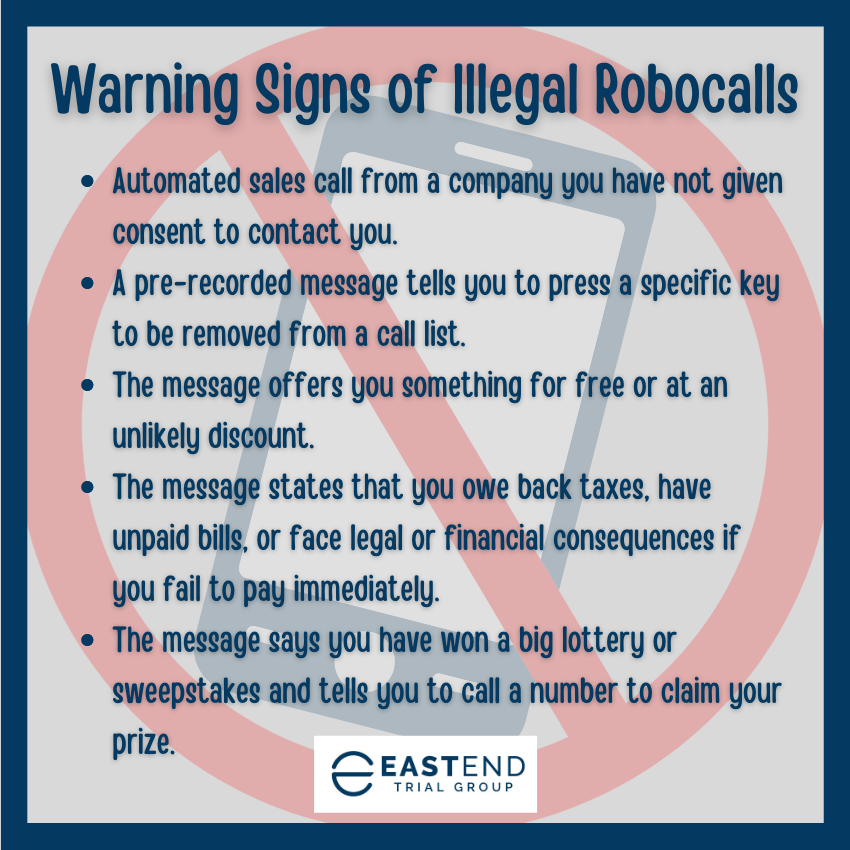After a slight decline at the beginning of the coronavirus pandemic, automated telephone calls known as “robocalls” have come back in overwhelming numbers across the country. Data from call-blocking and call-management services show that Americans received 50.5 billion automated phone calls in 2021, which is a 10 percent increase from the year before. One serious concern is that an estimated 42 percent of those calls were placed by fraudulent individuals and companies.
Some automated telephone calls deliver recorded messages that are useful, such as when they provide information about school closings, potential credit card fraud, leave appointment reminders, or medical notifications. However, continuous robocalls from debt collectors, telemarketers, and defrauders can be harassing and, in some cases, costly and dangerous. Although some automated telephone calls are legal, illegal robocalls are more common and can range from sales calls from companies you never authorized to contact you to attempts at outright theft.
Federal laws and state laws help protect consumers from telemarketing and fraudulent robocalls, but only to a certain extent. You may need advice from a knowledgeable Pennsylvania robocall lawyer to help with recovering economic losses inflicted by the fraudulent activity of companies and individuals.
What Is ID Spoofing?
Robocalls that use automatic dialing systems to send out thousands of phone calls per minute sometimes use misleading names or fake area codes designed to trick you into answering the call. This is a practice is referred to as “ID spoofing.” Robocallers often use caller ID spoofing to mask their real location, making it appear that they are calling from a local, familiar, or official number to increase the chances of you picking up the phone.
If you do pick up, the robotic voice might claim to represent a utility company, government agency, or well-known company. Robocallers posing to be from the IRS and Social Security are a common, well-known nuisance. In addition to those types of robocalls, fraud watchers have noted an increase in phony calls from popular companies, as the pandemic drove more people to shop online.
Other forms of robocall fraud involve offers for free goods or services, cheap health insurance, car warranties, or low-interest loans. Robocallers often dangle temptations like all-expenses-paid travel or demand payment for non-existent debts to convince you to send money or reveal sensitive personal data.
Engaging with a robocall message can lead to a live defrauder looking to get personal information, such as your Social Security number or credit card details. The simple act of pressing a key or answering a question alerts defrauders that they have hit on a live number and typically leads to even more unwanted calls.
What Are Warning Signs of Illegal Robocalls?

It is easy to recognize a robocall after you pick up the phone and hear an automated message, but with the advent of ID spoofing, many people don’t know they’re answering a robocall until they answer the phone. Considering the number of unwanted calls the average American gets throughout the day, even just picking up a fraudulent call feels like a stressful waste of time. Robocallers change their spoofed number frequently, sometimes for each call, which makes it that much more difficult to blacklist or block a bad number.
The following are some warning signs of an illegal robocall:
- An automated sales call from a company you have not given consent to contact you.
- A pre-recorded message tells you to press a specific key to be removed from a call list.
- The message offers you something for free or at an unlikely discount.
- The message states that you owe back taxes, have unpaid bills, or face legal or financial consequences if you fail to pay immediately.
- The message says you have won a big lottery or sweepstakes and tells you to call a number to claim your prize.
It is simple to stop answering calls from unknown or blocked numbers, however, modern technology allows robocallers to use tricks that make it difficult to actually recognize them.
What Federal Laws Restrict Robocalls?
Certain federal laws have been enacted to restrict unwanted calls in response to an increasing number of consumer complaints.
What Is the Telephone Consumer Protection Act?
Congress passed the federal Telephone Consumer Protection Act (TCPA) with the primary purpose of reducing the number of nuisance calls that consumers receive and to protect a consumer’s right to privacy. The TCPA imposes limits on the practices of telemarketers, collection agencies, and creditors, and their use of automated dialing and prerecorded voice messages to cellphones, residential phone lines, text messages, and unsolicited faxes.
In July 2020, the United States Supreme Court struck down a previous exception for the collection of government-owned debts. Today, robocalls to cellphones to collect debts owed to or guaranteed by the federal government, such as student loans and mortgage debts, are now banned along with other automated calls. This also means that no debt collectors can use robocalls to contact you on your cellphone.
The most important rules set forth by the TCPA include:
- Robocallers cannot call emergency lines, hospital guest rooms, heath care facilities, or retirement homes.
- Robocallers cannot call your cellphone without prior written consent.
- Robocallers cannot text your cellphone without prior written consent.
- Every company must maintain their own Do Not Call list. When a consumer requests to not be contacted again, that company must add them to their list.
- Every company must regularly check any call lists against all Do Not Call lists to make sure they do not violate this rule.
- Every company must have a detailed description of call procedures and training programs in place for their employees regarding the rules of the TCPA.
- Callers must provide full and prompt disclosure about who they are and why they are calling.
- Before any type of robocall is made, prior written consent is required.
- Past business relationship with consumer is no longer a viable way to circumvent the written requirement.
Telemarketing Sales Rule
Another federal law restricting robocalls is the Federal Trade Commission’s (FTC) Telemarketing Sales Rule. This rule prohibits robocallers from continuing to call you if you have stated that you do not want to receive calls from them, or your telephone number is on the national Do Not Call registry. However, if a robocaller can show that it obtained your express written consent to place calls to you, or that you have not said you do not want them to call you, then the robocalls may continue.
The Federal Communications Commission Rule
The Federal Communications Commission (FCC) Rule prohibits robocallers with pre-recorded voice messages from calling residential phone lines without the prior express written consent of the called party unless:
- The call is made for an emergency purpose.
- The call is not made for a commercial purpose.
- The call is made for a commercial purpose but does not include or introduce an advertisement or constitute telemarketing.
- The call is made by or on behalf of a tax-exempt nonprofit organization.
- The call delivers a specific type of health care message.
In addition, robocallers are not allowed to abandon more than three percent of all telemarketing calls that a live person answers. A call is considered abandoned if it is not connected to a live sales representative within two seconds of the called person’s completed greeting.
The Telephone Robocall Abuse Criminal Enforcement and Deterrence Act
The Telephone Robocall Abuse Criminal Enforcement and Deterrence Act (TRACED Act) makes it easier for consumers to identify robocalls so that they can avoid picking them up. The law pushes telephone companies to implement the STIR/SHAKEN system, which is an industry-developed standard designed to prevent defrauders from making calls that have inaccurate caller-ID information. Under this system, calls from numbers that seem suspicious show up on phones with labels such as “scam likely” or “spam likely.”
The TRACED Act also expands the authority of the FCC to impose civil penalties per call for each intentional violation. In addition, it increases the time period that the FCC can take action against those who intentionally violate the law to four years.
How Can I Stop Robocalls?
There is no way to completely stop robocalls. Because some of them are legal, there is no legal ground to ban them altogether. However, you can reduce the number of robocalls you get. Some measures you can implement to reduce the volume of robocalls you receive include:
- Register your number with the National Do Not Call Registry.
- Activate a robocall blocker from your carrier.
- Install a third-party application.
- Add an external robocall-blocker.
The laws and rules regarding robocalls are constantly evolving. Unfortunately, since robocalls are easy and affordable to run, the number of attempted fraudulent and illegal calls is growing every day.
A knowledgeable Pennsylvania robocall lawyer can help you understand the laws and protect your rights as a consumer. You may not be able to stop all robocalls, but a lawyer can help you file a lawsuit and recover damages.
Pennsylvania Robocall Lawyers at East End Trial Group Know the Law When it Comes to Robocalls and Deceptive Business Practices
Our Pennsylvania robocall lawyers at East End Trial Group fight for the rights of innocent consumers. We will help you understand all aspects of your robocall case. To schedule a free consultation, call us at 412-223-5740 or fill out our online form. Located in Pittsburgh, we serve clients throughout Pennsylvania.

 Call Us Today 412-223-5740
Call Us Today 412-223-5740